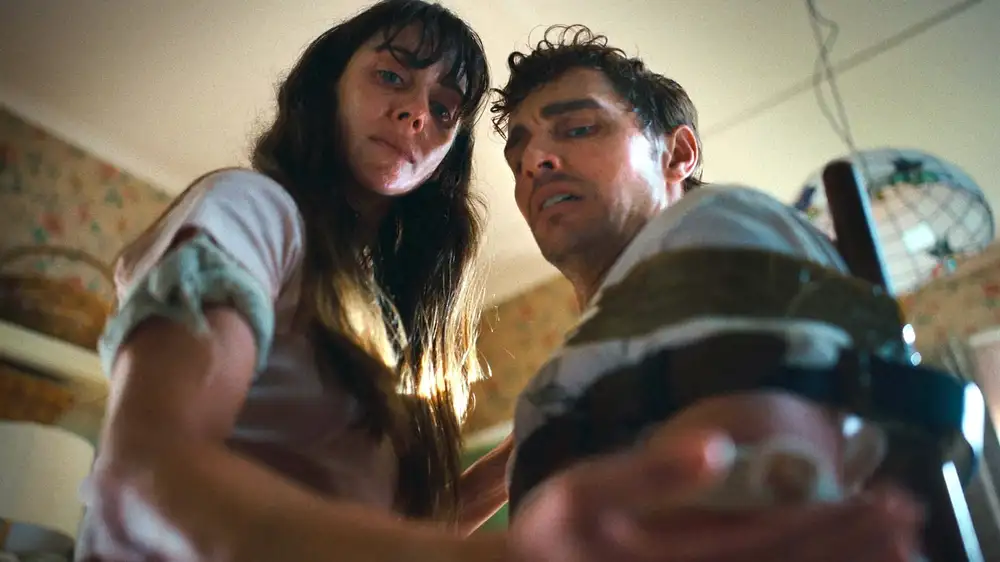Alison Brie and Dave Franco have been slapped with a lawsuit ahead of their upcoming horror movie Together, so here’s everything you need to know about the controversy and what it could mean for the film.
The new movie from writer-director Michael Shanks sees the real-life married couple star as a fictitious married couple, whose move to the countryside turns into a nightmare when a mysterious force causes horrifying changes to their bodies.
Following its premiere at this year’s Sundance Film Festival, Together received overwhelmingly positive early reviews. Right now, it has a 100% critics score on Rotten Tomatoes.
In short, there’s plenty of anticipation for the 2025 horror flick, but it’s now run into a massive issue thanks to a copyright infringement lawsuit against Franco, Brie, Shanks, and the production companies behind it.
Why are Alison Brie & Dave Franco getting sued?
Brie and Franco are among the defendants in the lawsuit filed by StudioFest on May 13, accusing Together of being a “blatant rip-off” of the 2023 movie Better Half.
For the uninitiated, Better Half is an indie film that centers on two people who meet for a one-night stand, only for their bodies to fuse during sex.
The complaint claims that StudioFest, a production, financing, and distribution company, acquired the exclusive rights to develop and produce Patrick Phelan’s script for the 2023 film, with the aim of casting Brie and Franco in the lead roles.
“In 2020 it submitted the Better Half script and synopsis directly to Franco’s and Brie’s agents at WME. Defendants Franco and Brie passed on the offer to star in the project,” it reads.
“But in January 2025, plaintiff learned that Franco and Brie were producing and starring in a virtually identical film entitled Together, written and directed by another WME client, Michael Shanks.
“Together is a blatant rip-off of Better Half. Both works center around a couple who wake up to find their bodies physically fused together as a metaphor for codependency.”
It goes on to accuse the Together team of copying other creative elements from the plot, themes, characters, dialogue, mood, setting, pace, and sequence of events, before being bought for $17 million by Neon.
Better Half producers Jess Jacklin and Charles Beale even went to Together’s premiere at Sundance to see if there were similarities.
“As the audience laughed and cheered, Jacklin and Beale sat in stunned silence, their worst nightmare unfolding,” the complaint continues.
“Scene after scene confirmed that defendants did not simply take ‘stock ideas’ or ‘scenes a faire’ but stole virtually every unique aspect of Better Half’s copyrightable expression.”
It highlights a list of similarities between the two horror movies, from dialogue and themes to characters and plot. Bizarrely, it claims they end in the same way: with the couple pulling out a vinyl record of the Spice Girls album Spiceworld while accepting their fate.
“By engaging in the conduct described above, defendants have committed and continue to commit copyright infringement,” it says.
The lawsuit is seeking monetary damages for StudioFest, and for any profits the defendants earned from the alleged infringement to be handed over to them under copyright law, although no specific amount has been announced.
Together agency claps back at allegations
While Brie and Franco have yet to publicly respond, WME – the agency representing both the actors and Shanks – has issued a rebuttal to the allegations.
A spokesperson for the talent agency told EW, “This lawsuit is frivolous and without merit. The facts in this case are clear, and we plan to vigorously defend ourselves.”
This kind of response suggests the agency views the lawsuit as an attempt to cash in on the success of Together, particularly after its Sundance acclaim and multi-million-dollar acquisition by Neon.
As of now, no court date has been set. Copyright infringement cases like this can take months (or even years) to progress, and many are quietly resolved out of court through settlements – especially if both parties want to avoid prolonged negative publicity or delays to release schedules.
That being said, Together is currently scheduled to hit theaters on July 30, 2025. Whether this lawsuit will delay the release is still unknown. If the case proceeds to court, the situation could become more complicated.
But unless StudioFest seeks and is granted a preliminary injunction (which would block release), the film’s rollout will likely move ahead as planned.
Still, legal battles like this can affect marketing or streaming service deals, especially if new information emerges or the case drags on. One way or another, Together will be under a much brighter spotlight – for better or worse.
What the public is saying
While the reaction to the case is mixed, one detail in the lawsuit stands out more than others: the Spiceworld reference at the end.
Taking to Reddit, one wrote, “The Spiceworld thing may be the dumbest thing I’ve ever heard if true and whoever was responsible for stealing it OK’d it in any way. You could maybe get around the Zeus thing… but the Spice Girls thing is insane.”
Another agreed, “Yeah, the Spiceworld thing is the real smoking gun, and the plaintiffs should be focusing more on that in the press. A lot of this can be attributed to linear thinking in court, but the Spiceworld bit is so so specific in a way that just can’t be explained away.”
“Yeah, I was a little skeptical because multiple people having the idea of a couple fusing together isn’t that outlandish to me but this definitely seems a little suspect,” added a third.
A fourth chimed in, “I think the crucial component here is that Brie and Franco were offered and had read the script for the original film and then shortly thereafter came up with the same concept ‘independently.’”

 Perseverance cattura l’alba marziana: Deimos in primo piano
Perseverance cattura l’alba marziana: Deimos in primo piano